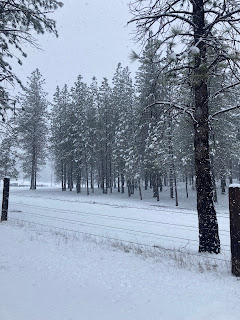Last Friday morning I woke up at 0200.
This is not terribly uncommon when I am at The Ranch. The change in time zones means that I am always ahead or behind myself both in waking and in sleeping - which makes for days in which one can get a lot done, but nights that can be quite short. Added to that was the fact that the wind was howling and making the branches of the oak at the back of the house creak and rattling something on the outer wall - the fuse box cover to the HVAC unit? I lay there after looking at my phone - 0200. I lay there until I realize I am not going back to sleep, and then get up.
I need more wood of course, and so go out the back door to the firewood. The wind is still howling, occasionally blowing snow around but nothing is coming down from the sky yet. There are tracks by the bird feeder; something small ran up to the edge of the house. What would be out in this kind of weather? Too small for anything but a fox or even a bobcat as a predator, or perhaps a rabbit if prey. The tracks do not seem to head back at all; it either ran along the sidewalk or more mysteriously disappeared. A mystery that will dissipate with either more snowfall or the melting of the same.
I grab several pieces of firewood to bring back into the house. I am the sort of person that dithers about how much I should bring in at one time and how big the individual logs should be. This is reflective of my decision making in general: I tend to dither about everything. I finally pick out five or six pieces of firewood, one that I think that will burn long enough until the time I am actually supposed to get up. As I am grabbing the wood, I give myself a little mental victory lap for filling the ricks up when the weather was much better this week; I do not often feel like I think ahead as I should.
I put the wood on the hearth, put one or two pieces in, and shut the stove door. The fire almost immediately ignites; there is always something reassuring to me when it does without my direct intervention. At a loss for what else to do, I decide I should probably pray, if nothing else: Surely I am up for a reason? Having no idea what else to pray, I grab my phone and in one of my Orthodox apps. There is a prayer set called The Hours; I open it and there are choices. Which hour is it? The First, the Third? I randomly select one and pray it. I am not Orthodox, but praying at night seems like something that needs structure.
Finishing, I settle into my father's chair by the fire and turn off the light next to the chair. The living room is now lit in flickering light by the blazing fire as the logs I have brought in break forth into blossoming flame and catches the wood grain of the antiques my father had purchased over the years and the glass of the pictures of my parents' dead (and mine) on the wall. I remember him doing this as well, gathering logs in the evening to feed to the fire at night when he would wake up from sleeping out in here. He worried in later years the fire wood go our; I have apparently lapped him in worrying much earlier in age.
Buried under on of the many quilts that my parents owned, quilts that I have no idea of their provenance or history, I eventually fall back to sleep. This is the way it can work, if I force myself to do it. The sleep is never as restful as an actual sleep earlier in the night, but I have learned that if I can somehow manage to gain that extra 45 minutes to an hours, it will make the difference between being completely exhausted from the moment I get up to being manageable exhausted or even possibly refreshed. The chair is not the most comfortable to sleep in; I am a bit surprised upon waking that I slept.
When I wake up, it is completely silent. The wind has died and the fire has burned low. Getting up to feed the fire, I look out the window. The front that was blowing in has arrived and now the night sky is filled with fat, drifting flakes everywhere I can see. I close the stove door again and go back to the chair and re-cover myself where I can see the snow falling while the orange light of the fire begins to refill the room. This contrast - fire, snow, crackling, silence - makes for a pleasure I can almost not express as it is both too private and too sacred to put into words. It is a measure of contrasts, presented here for me to see and experience, an unexpected gift.














































